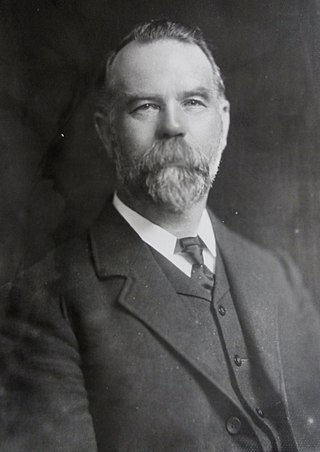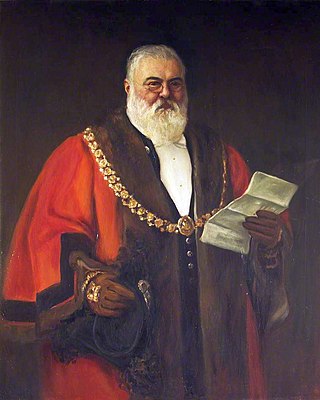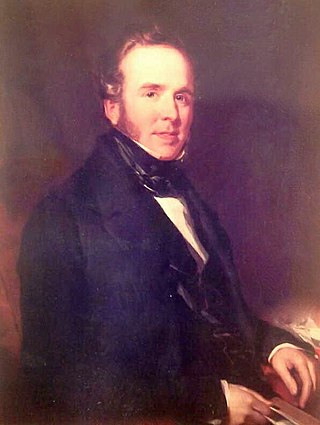
William Henry Wills, 1st Baron Winterstoke, known as Sir William Wills, Bt., between 1893 and 1906, was a British businessman, philanthropist and Liberal politician.

The Honourable Charles Herbert Mackintosh was a Canadian journalist and author, newspaper owner and editor, and politician. He served as mayor of Ottawa from 1879 to 1881, represented the City of Ottawa as a Liberal-Conservative Member of Parliament in the House of Commons of Canada from 1882 to 1887, and from 1890 to 1893, and served as Lieutenant Governor of the North-West Territories from 1893 to 1898, as it underwent a major transition toward responsible government.

Arnos Vale Cemetery, in Arnos Vale, Bristol, England, was established in 1837. Its first burial was in 1839. The cemetery followed a joint-stock model, funded by shareholders. It was laid out as an Arcadian landscape with buildings by Charles Underwood. Most of its area is listed, Grade II*, on the Register of Historic Parks and Gardens of special historic interest in England.

Sir Charles Manley Luke was a New Zealand politician and company director. He served as mayor of Wellington in 1895. His brother, Sir John Luke, was later mayor of Wellington from 1913 to 1921.

Henry Overton Wills III of Kelston Knoll, near Bath in Somerset, was a prominent and wealthy member of the Bristol tobacco manufacturing family of Wills which founded the firm of W. D. & H. O. Wills. As a philanthropist his best-known act was the funding of the University of Bristol, founded in 1909, of which he became the first Chancellor.

The Trinity Centre is a community arts centre and independent live music venue.The building has been managed by Trinity Community Arts Ltd. since 2003 and was formerly the Holy Trinity Church, in the Parish of St Philip and St Jacob, Bristol, UK.

Sir John Pearce Luke was a New Zealand politician. Luke was Mayor of Wellington from 1913 to 1921 and Member of Parliament for Wellington Suburbs 1908–1911 and Wellington North 1918–1928. His brother Charles Manley Luke had previously also been Mayor of Wellington in 1895. Sir John Pearce was nicknamed Peanut because he was short.

Brislington West is a council ward of the city of Bristol, England. It covers the western part of Brislington, together with Arnos Vale and Kensington Park.
Francis Noot Bacon was a director of Bristol City. He was born and died in Bedminster, Bristol. He was installed as temporary manager between October 1910 & January 1911 after the dismissal of Harry Thickett. In January 1911 Sam Hollis took over for his third, and final, spell as manager.

Sir Joseph Dodge Weston was an English merchant and shipping magnate and Liberal politician who was active in local government and sat in the House of Commons in two periods between 1885 and 1895.

Elisha Smith Robinson (1817–1885) was an English businessman and politician.

Arnold Wathen Robinson RWA, FMGP (1888–1955) was an English stained-glass artist. Although Robinson's family, on the paternal and maternal side were involved in local government, he sought a career as a stained-glass artist. During World War I he initially enlisted in the Artists Rifles, and was then released from military service to manage a shell factory. Three of his four younger brothers were to be killed in the Great War.
Wathen is a surname, and may refer to:

Joseph Griffiths Swayne (1819–1903) was an English obstetric physician. He is now known for investigations on cholera, which may have anticipated the discovery of the responsible micro-organism by Robert Koch
Bristol Uniforms is a British clothing company that specializes in the manufacture of modern-day safety and fire protective clothing.

Sir Frank William Wills of Berkeley Square, Bristol, England, was a member of the Wills tobacco family, who became a noted British architect and went on to serve as Lord Mayor of Bristol.

Henry Overton Wills II of Ashley House, in Bristol, England, was a tobacco merchant who in 1830 together with his elder brother William Day Wills co-founded W.D. & H.O. Wills, a company which by the late 1800s had become Britain's largest importer of tobacco and manufacturer of tobacco products.

William Day Wills of 2 Portland Square, Bristol, England, was a tobacco merchant who in 1830 together with his younger brother Henry Overton Wills II took over W.D. & H.O. Wills, a company which by the late 1800s had become Britain's largest importer of tobacco and manufacturer of tobacco products.
Alfred Stone was an English musician, choir-trainer, composer, and Church of England organist.















